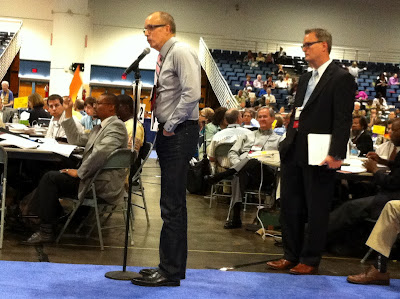So, GC2012 is a wrap. Here's a final video showing some of the highlights of the time our delegation spent together. Things didn't quite go the way we had hoped; but God isn't finished with us, yet!
God Bless,
Mary Spradlin
My experience as a first-time clergy delegate to the UMC General Conference, 2012.
 |
| Rev. Mark Holland of Trinity UMC, Kansas City, KS. Mark and I were undergraduates together at SMU. |
 |
| I am grateful to have been mentored by Bishop Minerva Carcano. |
 |
| Divestment from companies fueling Israel's military occupation of Palestinian lands was strongly urged by demonstrators. The petition to divest was not supported. |
Over and over and over again, legislative changes slowed to a crawl as concerns were raised about whether or not a petition reflected the diversity of the global church. Were all countries represented fairly? (And, for that matter, were women, young people, and others who are marginalized in the U.S. fairly represented?) Who was at the table when decisions were made?
These are valid questions. In many cases, these questions need to be asked and answered. But it seems apparent to me that we cannot possibly continue to operate in the structure we are currently using. The enormous cost of flying all of the delegates to General Conference and housing them for two weeks alone is staggering. How can our Boards and Agencies operate effectively and efficiently while maintaining the kind of diversity that a global church requires? Attempts to downsize our Boards are criticized as attempts to marginalize certain people. And so, on the floor, the number is increased. And so is the cost. So Boards meet less frequently. It seems reasonable to then assume that the work of disciple-making suffers.
On the one hand, we want a truly global church. We value the voices of our brothers and sisters around the globe. Good, faithful work is being done in churches throughout our world. Jesus has sent us to make disciples "of all nations." It should not matter who pays the tab.
"The Jesus in me meets the Jesus in you." Rev. Brenda Wier of the Central Texas Conference delegation sings with our tablemate, who is from the North Katanga Conference of the Democratic Republic of Congo. I hope you will click here to see some of the amazing ministries of the United Methodist Church in North Katanga.
On the other hand, it seems absurd that Central Conference delegates are voting on our pension and on our ordination process. Cultural understandings differ greatly among the countries of the UMC: how can we expect to easily agree on issues raised in our Book of Resolutions? Our life experiences, the culture of our societies, our understanding of racism and sexism, our true needs and even our languages differ so widely: how can we sit down together every four years and agree on a budget?
Four years from now, I have every reason to believe that the percentage of delegates who come from outside the U.S, with the largest majority of these coming from Africa, will be greater than 50%. On matters that affect the U.S. church uniquely, it will be virtually impossible (as it is now) to tell what it is that U.S. delegates truly want. This past week, I heard many voices crying out that the young people of our (U.S.) society are not interested in being a part of a denomination that ______________. And we desperately want young people to have a relationship with God through Jesus Christ. I am not certain that the Social Principles that set forth our understanding of how we are to be in relationship with God and with neighbor can possibly be expressed in ways that represent a united, faithful response from Christians who come from all parts of the globe.
Indeed, the global nature of our church is an extremely complex issue. It seems that we want a global church, we want God to be glorified through the ministries of the UMC throughout the world, we want our denomination to reflect the diversity of God's good creation - but we simply do not know how to make this work.
 |
| Make no mistake: as long as we have local churches, the mission and ministries of the United Methodist Church will go on! |
 |
| GC 2012 Lost and Found. Not sure all of us can read the DCA! |
 |
| Rev. Mike Slaughter and Rev. Adam Hamilton present a substitute petition to "commit to disagree with compassion, grace and love" on the issue of homosexuality. |
The church has different understandings of this issue: Many people feel that we need to take a strong stand against homosexuality, and many people feel that we should be totally inclusive...We want winners and losers, but we should be truthful about the fact that we disagree. If you need to go home and tell people we do not stand for homosexuality, then do that. But some of us need an opening to reach young people where they are. Let us vote for what is God's will - that is, that we disagree. We would prefer to have a single stance, but in this case, we have dual standards.Adam Hamilton then took the floor, presenting a substitute amendment (paragraph 161f in the Book of Discipline), below: